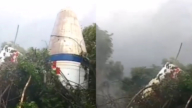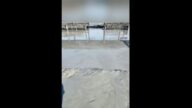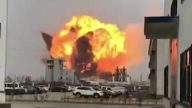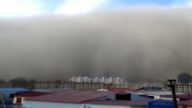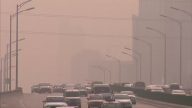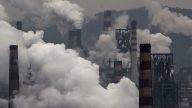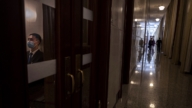【新唐人2013年02月18日讯】山东潍坊等地的企业用高压水井把污水压到地下,导致水污染。相关政府监管部门至今仍然保持沉默。当地民众强烈谴责地方政府和无良企业。然而,更有网友爆料,潍坊当局一方面在北京疏通中央,企图下发封口令,阻止地下污水丑闻进一步曝光,另一方面扣留了当地的40多人,包括记者在内。下面请看本台记者的报导。
中国大陆的环境污染已经从地面,天空,再渗透到地下。日前,公益人士邓飞在微博爆料指称,山东潍坊的化工厂和造纸厂,将致命性的污水通过高压水井压到地下,逃避监管。而地下排污法已在很多地方悄悄进行多年。
这一消息引起网友们的关注纷纷转发,并谴责官商勾结,和这种“断子绝孙”的无耻行径,让诸多同胞成了地下水污染的“难民”。
不过,监管部门至今没有作出任何回应,甚至连一句惯用的“正在调查”也没有。有网友质疑,在民众频频举报,媒体屡屡曝光的情况下,地方政府和环保、安监部门在检查中不可能没看出猫腻,唯一的解释是“睁眼瞎”。
环保自愿者、民间水专家张俊峰:“地方一些追求经济的官员 和企业之间互相串通在一起,或者互相配合,作出这种欺上瞒下的情况。使得这个企业依旧能够正常的生产、依旧能够正常的纳税、依旧可以给当地的地方带来一定的收益。但是他们却不顾及由此带来的这种危害,对别人的危害,对后代的危害。”
2月16号晚,邓飞在微博上发布了一个更令人寒心的消息,他说,山东潍坊政府采取双管齐下的方式应对危机:一方面派人到北京疏通关系,企图封杀地下污水丑闻,另一方面在当地还扣留了包括记者在内的40多人。
环保自愿者、民间水专家张俊峰:“地方政府为了自己的经济利益,不惜动用公权力,对这种监督行为对这种举报行为进行非常残酷的一种打压。他们是不允许有这种不同意见来发表出来。
实际上,“污水直排地下”并不是新闻。早在2010年5月,大陆《半月谈》时政党刊就发出“地下排污:致命威胁悄悄逼近”的警报。杂志直指污染企业除了挖渗坑、渗井偷排污水外,有的还用高压泵将大量污水直接注入地下。南方的一些企业甚至将污水排入地下溶洞。
虽然杂志报导在当时激起一时的舆论波澜,却在当局“化骨绵掌”的应对下销声匿迹。然而地下排污不仅没有得到有效遏制,还引发了更多的恶性环境污染事件,和各地民众抵制污染企业的群体性事件。今年大年初一,江西上饶玉山县双元村就有上千村民举行示威,抗议当地“三清化工厂”污染水土和空气。
山东烟台居民张先生:“他们作为执法部门,根本就不作为。像这种情况下,想制止的话应该是很难的。说是山东这,中国各地都是一样。这些部门现在已经基本上已经形成一种利益交换,利益共享的这种格局。就是说花一点钱,然后摆平了,你们都走吧,反正我该污染还是污染我的。基本上就形成了这种行政不作为。”
四川成都的维权人士黄琦对《自由亚洲电台》表示,水土是农民赖以生存的命根子,当局在污染问题上官商勾结,包庇污染企业,在环保数据上作假,造成了官逼民反的局面。
中国水资源总量的1/3是地下水。中国地质调查局的专家在国际地下水论坛的发言中曾提到,中国90%的地下水遭受了不同程度的污染,其中60%污染严重。
据《新华网》报导,对118个城市连续监测的数据显示,约有64%的城市地下水遭受严重污染,33%的地下水受到轻度污染,基本清洁的城市地下水只有3%。
采访/易如 编辑/李明飞 后制/陈建铭
Communist Regime Ignores Water Pollution and Hurts Generations to Come
Industrial waste water in Weifang, Shandong Province,
which has been released through high-pressure wells, has caused ground water pollution.
The regulatory authorities have remained silent
despite people’s complaints.
Recently, Weifang officials were said to have kept
the scandal from further exposure by working through
Beijing and detaining more than 40 locals and journalists.
The following is our report.
Environmental pollution in China has covered the land,
the sky, and even penetrated the deep ground.
Recently, environmentalist Deng Fei broke the news
via microblogging that chemical plants and paper mills
in Weifang, Shandong, have avoided regulation
by discharging fatal sewage through high-pressure wells to the underground.
This underground disposal method has been conducted
for years in many places.
This information was re-posted by many netizens.
People condemned this collusion between government
and business as shameless, and believe it has turned many citizens into the victims of groundwater pollution.
However, the regulatory authorities have not made
a statement, not even the usual “it’s under investigation."
Some netizens believed the government, the regulatory
and safety departments have kept their eyes closed
on pollution issues even though there have been
so many exposures by individuals and media.
Environmentalist and water expert Zhang Junfeng: “This
is a collusion between local officials and business in the name of economy.
The business continues to produce products and
taxes for the locals.
However, it’s at the cost of people’s lives and
generations to come.”
On the evening of February 16, Deng Fei released
a chilling message on his microblog.
The Weifang government took a two-step approach
to deal with the pollution news.
They sent people to Beijing to clear the underground sewage
scandal, and detained more than 40 locals and reporters.
Zhang Junfeng: “The local governments brutally
suppressed people’s rights to supervise and impeach. No different opinions are permitted."
In fact, the direct discharge of sewage underground
is not news.
As early as May 2010, the regime’s mouthpiece,
Banyuetan magazine, warned the underground sewage threat and that it was quietly killing.
The magazine pointed out that the industries have been
releasing wastewater by digging seepage pits and seepage wells and using high-pressure pumps.
Some businesses in the south even discharged
sewage into the underground cave.
That report provoked momentary criticism
which was later erased.
Underground sewage has not been effectively curbed,
but has triggered a series of vicious environmental pollution incidents and protests.
On this Chinese New Year’s Day, thousands of villagers
from Shuangyuan Village, Jiangxi,
protested against the local pollution of land,
water and air by Sanqing chemical plant.
Mr. Zhang, a resident of Yantai, Shandong:
“The law enforcement agencies simply do not function.
It is hard to stop the pollution.
It is the same everywhere in China.
These departments only care about money.
With some money, no trouble will be attached.
The pollution will continue.
There is no governing."
Human rights activist Huang Qi of Chengdu, Sichuan,
told Radio Free Asia that farmers rely on the land and water.
The collusion between government officials and business
has left the pollution problems untouched and caused falsification of environmental research.
People are thus forced to rebel.
Groundwater occupies one third of the total water resources
in China.
In the International Groundwater Forum, China Geological
Survey revealed that 90% of China’s groundwater suffered pollution of various degrees.
60% of the polluted water is considered heavily polluted.
Xinhua News Agency reported that of 118 cities that monitor
underground water, about 64% percent of urban groundwater
is heavily polluted, 33% of groundwater has mild contamination,
and only 3% of urban groundwater is considered clean.


